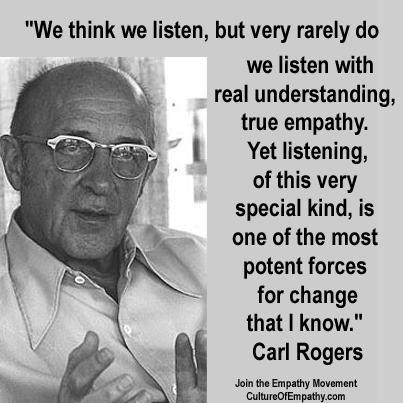FAVE ! First Acknowledge, Validate and Empathize.

Effective coach training teaches about the power of relationship, of person-to-person connection, not just because it’s warm and “nice”, but because all the evidence from coaching and psychotherapy says it works! We each need to feel truly heard by others that we are attempting to be in relationship with. When we share our lives, our experiences and our feelings we truly want to have acceptance, acknowledgement, and validation.
If I share that I have been in pain since an injury and it is breaking my heart that I can’t get out and enjoy the physically active things I love to do, I don’t want someone to consult with me about a solution (“Let’s explore what you can do to exercise now.”). I want someone to say “Wow! That must be so terribly difficult for you to be unable to exercise.” I want them to “get it” that I’m not only in pain, but I’m frustrated, angry, stuck, depressed, and feeling loss. I want to HEAR that they “get it”.
Once I feel like my experience is understood at that heart level, that my feelings have been affirmed, and it’s been conveyed that it’s okay for me to feel the way I feel, THEN I’ll be happy to launch into some great strategic thinking about seeking solutions.
 When coaches convey what I love to call The Facilitative Conditions of Coaching (see my previous post: http://wp.me/pUi2y-6i) clients feel the validation, acceptance, acknowledgement that we’re talking about. Coaches have to find the words to convey empathy, acknowledgement, unconditional positive regard, warmth and genuiness. But, they have to remember to do that FIRST, before they jump to solution seeking.
When coaches convey what I love to call The Facilitative Conditions of Coaching (see my previous post: http://wp.me/pUi2y-6i) clients feel the validation, acceptance, acknowledgement that we’re talking about. Coaches have to find the words to convey empathy, acknowledgement, unconditional positive regard, warmth and genuiness. But, they have to remember to do that FIRST, before they jump to solution seeking.
Having trained over 4,000 wellness coaches worldwide, I’m continually amazed by two things: 1) we train some of the warmest, kindest, most caring people on the planet, and 2) when learning the new skill of coaching these same wonderful people so often totally forget to express warmth, kindness and caring. They struggle on the hot seat of
demonstrating/practicing coaching, and in their anxiety of new learning, instead plow right into seeking to “fix” the problem presented. No statements of empathy. No expression of understanding what the client is feeling. Instead one question after another seeking to find a solution (So what types of exercise have you already tried since your injury?). And by the way, we have observed no difference here by gender, probably 85% of the coaches we have trained have been female.
Remember to be a coach, not a consultant. Consultation is all about finding solutions. Consultants name their businesses things like “Totally Amazing Solutions, Inc.”. Coaches help people discover/create their OWN solutions, they don’t just provide them for their clients…that’s consulting. The mindset shift from treatment provider, consultant (medical or otherwise), or educator to that of coach takes repetitive practice. It’s so easy to slip back into the “What wrong and how can we fix it?” thinking, instead of staying in the coach’s “What’s possible?” thinking.
Acronyms can help us remember processes. Let’s try this one: FAVE.
FAVE: First acknowledge, validate and empathize.
As our client’s story unfolds tune into it with the mind of compassion, the mind of understanding and the mind of connection. Some of what works is relaxing into the coaching process and realizing that just by being true to our naturally warm and empathic way of being we are providing that “safe container”. We “hold sacred ground” for our clients to do the exploration they need to do. When solution finding is embarked upon without adequate exploration, the path taken is often unproductive at best and counterproductive at worst.
So, FAVE! First of all ACKNOWLEDGE your client’s experience. Paraphrase, restate and reiterate what they have said. Remember to reflect their feelings. Help them feel that it has been recognized that they have been experiencing the emotions they have been living. Acknowledge the courage it takes to share. Acknowledge the self-caring it takes to seek help and assistance. Acknowledge the depth of your client’s challenges, their strengths, etc. So you haven’t been able to run or bike ride for three months now. How tough it must be to go from being so athletic to hardly exercising at all! Tell me more about what that has been like for you.
As you do this you VALIDATE their experience and their emotions. Your unconditional positive regard (and therefore lack of judgment) makes it possible for the client to feel that it is okay for them to feel the way they feel. You are affirming that what they have told you has been their reality. You help the client feel that their story is validated, and as you coach further, with that accepting and yet at times challenging coaching presence, you help them learn that they are NOT their story. As you acknowledge, affirm and validate you help them feel well heard. You help them explore their experience and EXPRESS their feelings about it so they can let go of it, put it in the rear-view mirror, and realize they are not trapped by their story.
Our most powerful vehicles to convey this acceptance and affirmation, this sense of support is the EXPRESSION of empathic understanding. That kind look in the eyes, your thoughts of compassion are very sweet, but they are not enough. We have to put it into words (think telephonic coaching!) and COVEY our empathy. So when you have free time you just have to sit there and wish you were able to move like you used to. How challenging! You must miss being active very much. It sounds like you’ve tried to deal with as best you can, but it’s got to be a real loss for you.
It takes courage on the part of the coach to practice FAVE. You’ve got to be okay with emotion, not afraid of it. Empathy is not trying to cheer the person up, quickly reassuring them that everything will be all right, in essence rescuing them. This conveys a message like “Don’t feel they way you’re feeling. Feel the way I’m more comfortable with you feeling. Cheer up!” FAVE is getting down in the mud, or up riding high in the sky WITH our clients…meeting them where they are at, not where we want them to be. I want MY reality acknowledged, not YOUR fantasy!
 Creating “Sacred Space”
Creating “Sacred Space”
The thing to remember is that when we allow our clients to feel the way they feel they usually do so and move through it more fluidly. When they are not able to, even after our repeated attempts at providing our best facilitative conditions, it’s probably time to consider referral to a mental health professional (see my previous post http://wp.me/pUi2y-bA.).
Perhaps some of our “rush to solution” is connected to our fear of dealing more directly with feelings. I’m not going to second guess a coach’s intentions and motivations here. I would just love to see coaches serving their clients in the most effective way possible, and that begins with FAVE.
What are some of your thoughts on the idea of making acknowledgement of our client's experience a priority? Please leave your comments.








Only registered and logged in readers can leave comments.